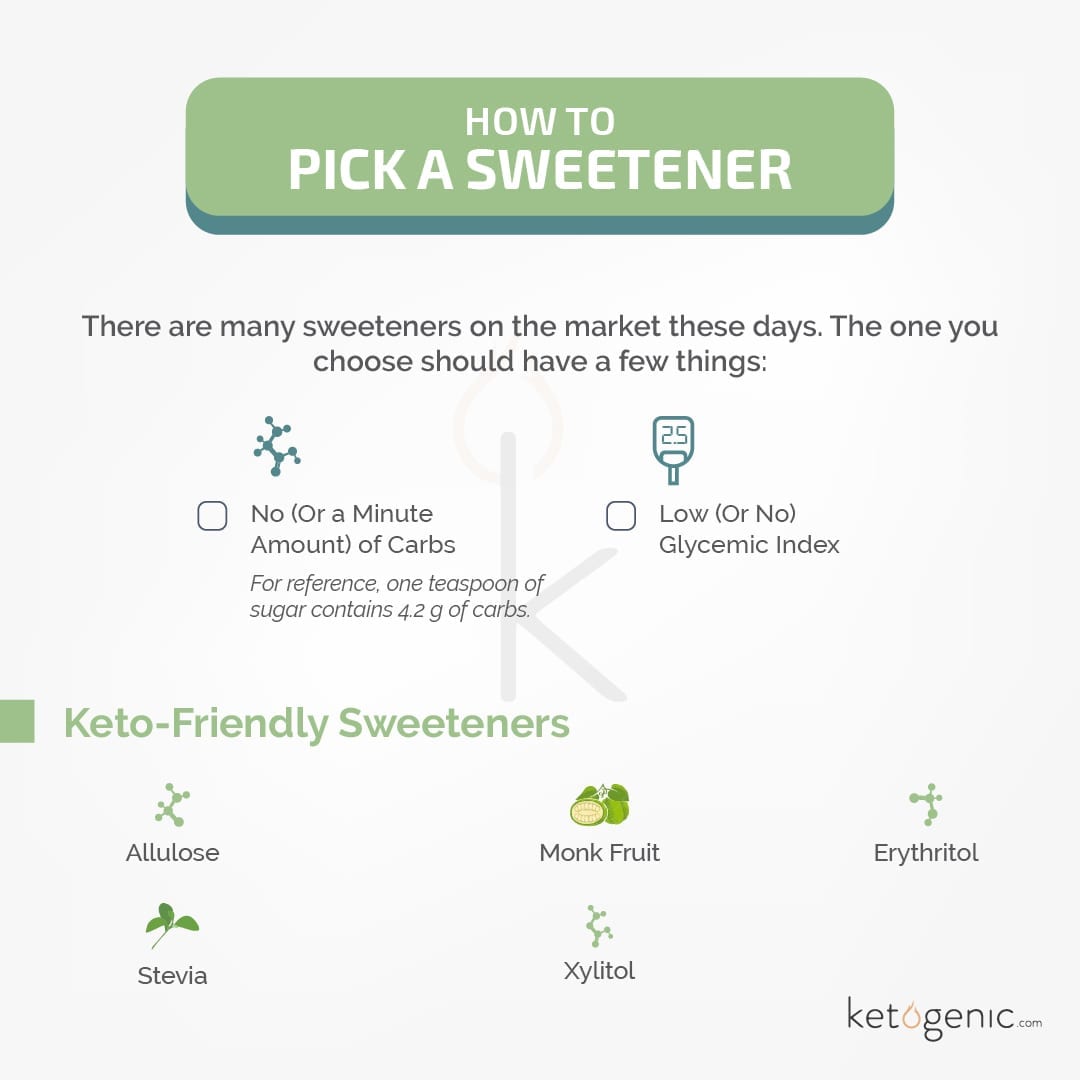
When you think of sugar alcohols you might think of sugar-free gummy bear horror stories. Or maybe you think that it has something to do with sugary-sweet cocktails. Either way, if you are on the ketogenic diet, chances are, you are going to come into contact with these sweeteners in various food products. But, what exactly are sugar alcohols?
Are they keto? Do they have side effects? Let’s go over it!
What Exactly Are Sugar Alcohols?
Sugar alcohols are found in products labeled sugar-free (drinks, gum, and food), as well as naturally in certain fruits and vegetables. They are commonly used as sugar substitutes and advertised as having 0 calories per gram. They are often used as an alternative to table sugar (sucrose) because they are sweet-tasting but can claim no sugar added on the packaging.
As the name suggests, sugar alcohols (also known as polyols) are sugar compounds that have a chemical structure similar to glucose but with a hydroxyl group (-OH, or alcohol group) attached. They are similar in structure to glucose (with the addition of the alcohol group, of course) and taste sweet, but are digested differently than glucose. Because of this, most sugar alcohols are only partially digested and thus yield fewer calories and carbohydrates. [1]

What Are the Different Types of Sugar Alcohols
Not all sugar alcohols are the same. The most commonly used include xylitol, maltitol, sorbitol, and erythritol. Mannitol and glycerol are also polyols. All of these sweeteners vary slightly in structure, but still, maintain the core of being a sugar with an additional alcohol group attached.
The differences in structure account for differences in digestion and impact on blood sugar levels. [2]
Absorption, Digestion, and Side Effects
Polyols are partially digested in the small intestine. Remnants that are not digested are broken down by bacteria in the large intestine and passed through stool. [3]
Sugar alcohol breakdown can lead to GI disturbances. Polyols draw in water in the intestine, which can lead to diarrhea. Additionally, the breakdown of sugar alcohols by bacteria in the large intestine can lead to gas. Other symptoms of sugar alcohol consumption can include stomach cramps and bloating. [4]
These symptoms are most severe when consuming maltitol. In fact, most sugar-free products (like Hershey’s sugar-free chocolate or Haribo Sugar-Free Gummy Bears) include a warning label that maltitol has a potent laxative-like effect!
Erythritol is the most well-tolerated, leading to fewer symptoms than the others. [4] [5]

Conditions like IBS (irritable bowel disease), Crohn’s Disease, and other inflammatory diseases can increase rates of malabsorption of sugar alcohols, making symptoms far worse. [4]
Side effects of sugar alcohol consumption are dose-dependent, meaning the more you consume, the worse the symptoms will be (and vice versa). Additionally, research shows that symptoms are worse when sugar alcohols are consumed with other carbohydrates. [4]
Which Sugar Alcohols Are Keto? Which Aren’t?
Erythritol is the most ketogenic-friendly sugar alcohol. It is commonly found in keto baked goods and drinks. Research suggests it does not impact blood glucose levels and causes minimal GI issues. [5] [6] [7]
Xylitol can also be consumed on a ketogenic diet. This sweetener is commonly found in chewing gum since research shows it may improve oral health and prevent tooth decay. It does have a slightly higher glycemic index than erythritol and can cause a slight increase in blood glucose levels, but is generally well-tolerated. [8] [9]
Note: xylitol is toxic to dogs and should be avoided if you have a pet-friendly home.
Maltitol and sorbitol are two polyols that should be avoided on a ketogenic diet. They are partially digested, cause an increase in blood glucose levels, and can cause severe GI issues. [10] [11]

Can You Subtract Sugar Alcohols From Total Carbs?
The answer is yes and no. It depends on the sweetener.
Net carbs are typically calculated as total carbohydrates – fiber – the amount of sugar alcohol = net carbs. However, sweeteners like maltitol and sorbitol are digested and can spike your blood glucose levels. Therefore, to stay safe, it is best to only subtract erythritol from your total carbs when calculating net carbs.
In some cases, xylitol can be subtracted too, just make sure you aren’t consuming too much because it can cause a glycemic response.
Do You Eat Sugar Alcohols on the Ketogenic Diet? Or Do You Avoid Them?
Comment below and share your thoughts on consuming products with polyols on the keto diet with the community!
References
Mäkinen K.K. (1994) Sugar Alcohols. In: Goldberg I. (eds) Functional Foods. Springer, Boston, MA. https://doi.org/10.1007/978-1-4615-2073-3_11
Livesey G. Health potential of polyols as sugar replacers, with emphasis on low glycaemic properties. Nutr Res Rev. 2003 Dec;16(2):163-91. doi: 10.1079/NRR200371. PMID: 19087388.
Beaugerie L, Flourié B, Pellier P, Achour L, Franchisseur C, Rambaud JC. Tolérance clinique, absorption intestinale et valeur énergétique de quatre polyols pris à jeun [Clinical tolerance, intestinal absorption, and energy value of four sugar alcohols taken on an empty stomach]. Gastroenterol Clin Biol. 1991;15(12):929-32. French. PMID: 1783248.
Lenhart, A., & Chey, W. D. (2017). A Systematic Review of the Effects of Polyols on Gastrointestinal Health and Irritable Bowel Syndrome. Advances in nutrition (Bethesda, Md.), 8(4), 587–596. https://doi.org/10.3945/an.117.015560
Storey D, Lee A, Bornet F, Brouns F. Gastrointestinal tolerance of erythritol and xylitol ingested in a liquid. Eur J Clin Nutr. 2007;61(3):349–354. doi:10.1038/sj.ejcn.1602532
Wölnerhanssen BK, Cajacob L, Keller N, et al. Gut hormone secretion, gastric emptying, and glycemic responses to erythritol and xylitol in lean and obese subjects. Am J Physiol Endocrinol Metab. 2016;310(11):E1053–E1061. doi:10.1152/ajpendo.00037.2016
Regnat, K., Mach, R. L., & Mach-Aigner, A. R. (2018). Erythritol as sweetener-wherefrom and whereto? Applied microbiology and biotechnology, 102(2), 587–595. https://doi.org/10.1007/s00253-017-8654-1
Mäkinen K. K. (2016). Gastrointestinal Disturbances Associated with the Consumption of Sugar Alcohols with Special Consideration of Xylitol: Scientific Review and Instructions for Dentists and Other Health-Care Professionals. International journal of dentistry, 2016, 5967907. https://doi.org/10.1155/2016/5967907
Mäkinen K. K. (2016). Gastrointestinal Disturbances Associated with the Consumption of Sugar Alcohols with Special Consideration of Xylitol: Scientific Review and Instructions for Dentists and Other Health-Care Professionals. International journal of dentistry, 2016, 5967907. https://doi.org/10.1155/2016/5967907
Secchi A, Pontiroli AE, Cammelli L, Bizzi A, Cini M, Pozza G. Effects of oral administration of maltitol on plasma glucose, plasma sorbitol, and serum insulin levels in man. Klin Wochenschr. 1986 Mar 17;64(6):265-9. doi: 10.1007/BF01711933. PMID: 3520129.
Ruskoné-Fourmestraux A, Attar A, Chassard D, Coffin B, Bornet F, Bouhnik Y. A digestive tolerance study of maltitol after occasional and regular consumption in healthy humans. Eur J Clin Nutr. 2003 Jan;57(1):26-30. doi: 10.1038/sj.ejcn.1601516. PMID: 12548293.









